Iran to train 3,000 snipers annually, says army ground forces commander
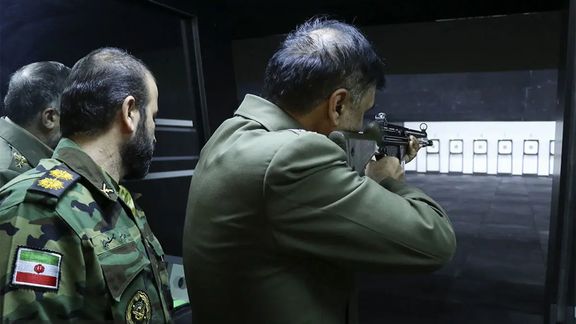
Iran's army plans to train 3,000 snipers annually in its shooting schools and training facilities, the army's ground forces commander announced on Monday.

Iran's army plans to train 3,000 snipers annually in its shooting schools and training facilities, the army's ground forces commander announced on Monday.
Speaking at the opening of the first comprehensive shooting exhibition and shooting range monitoring system, Brigadier General Heidari stated, "We plan to train 3,000 snipers annually in our shooting schools and training facilities in the future."
He added that the army has equipped 86 shooting ranges using the capabilities of the shooting federation and has already trained 2,700 snipers for ground forces units in the first phase.
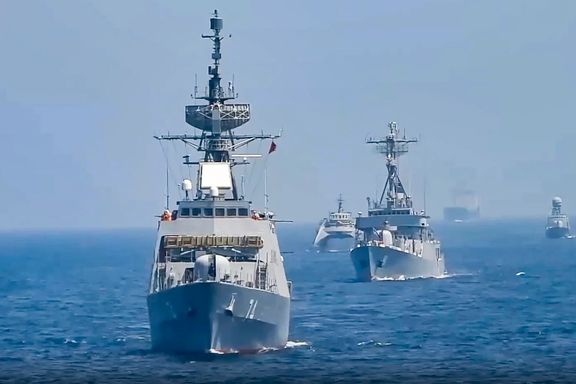
Warships from Russia and China entered Iran's territorial waters ahead of joint naval exercises set to begin Tuesday, a move dismissed by US President Donald Trump as inconsequential.
The Security Belt-2025 drills, taking place annually near the Iranian southeastern port of Chabahar, in the northern part of the Indian Ocean, mark the fifth such exercise between the three nations since 2019, showcasing their deepening military ties amidst geopolitical tensions.
Asked on Sunday if the drills concerned him, Trump told Fox News, “No. Not at all. We’re stronger than all of them. We have more power than all of them. I rebuilt the military.”
The exercises involve warships and support vessels from the Iranian Navy and the Islamic Revolutionary Guard Corps (IRGC) Navy, alongside Russian and Chinese naval forces. Observers from Azerbaijan, South Africa, Oman, Kazakhstan, Pakistan, Qatar, Iraq, the United Arab Emirates, and Sri Lanka are also present.
Russia's Defense Ministry confirmed the participation of 15 combat ships, support vessels, and gunboats, as well as helicopters. China deployed a guided-missile destroyer and a supply ship.
The drills will include simulated attacks on maritime targets, search and seizure operations, and search and rescue exercises.
The location of the drills, the Gulf of Oman, is a critical waterway for global oil trade, linking the Indian Ocean to the Strait of Hormuz and the Persian Gulf.
This year's exercises come at a time of heightened tensions in the region, with Trump recently reiterating his "maximum pressure" campaign on Iran, aimed at curbing its nuclear program.
The US maintains a significant military presence in the region, with its Fifth Fleet based in Bahrain.
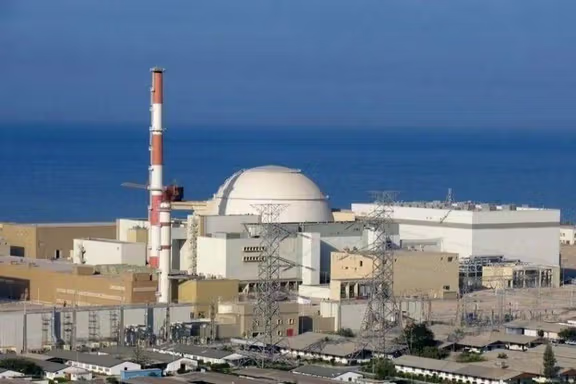
Qatar's prime minister has warned that an attack on Iran's nuclear facilities would contaminate the waters of the Persian Gulf, threatening life in Qatar, the UAE and Kuwait.
Sheikh Mohammed bin Abdulrahman Al Thani said on Sunday that an attack on Iran's nuclear sites would leave the Persian Gulf with "no water, no fish, nothing ... no life".
He specifically mentioned his country, Kuwait and the UAE, and said some of Iran's nuclear sites were closer to Doha than they were to Tehran. Iran's only operating nuclear power plant is on the Persian Gulf coast at Bushehr.
Qatar, the UAE and Kuwait are three desert states, facing Iran on the opposite side of the Persian Gulf, with minimal natural water reserves and more than 18 million people whose only supply of potable water being desalinated water drawn from the Persian Gulf.
Israel has repeatedly threatened to bomb Iran’s nuclear sites but on Friday, US President Donald Trump said he had written to Iran warning it to open negotiations or face a military attack.
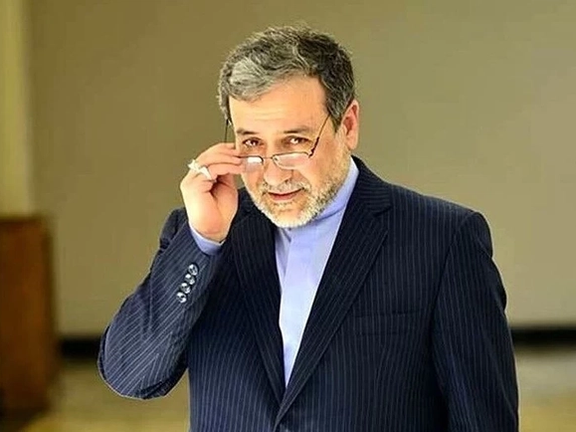
Iran's foreign minister says the country’s nuclear program cannot be destroyed by military means, citing the program's widespread dispersion and robust protection.
During an interview at the Iranian consulate in Jeddah, Saudi Arabia on Friday, Foreign Minister Abbas Araghchi told AFP, “Iran's nuclear program cannot be destroyed through military operations" because the technology is ingrained, facilities are dispersed and protected, and Iran would retaliate proportionally.
He made the remarks as Israel has repeatedly threatened to bomb Iran’s nuclear sites. Later on Friday, US President Donald Trump said he had written to Iran warning it to open negotiations or face a military attack.
Araghchi said that “if the Israelis or others were sure that they would achieve their goals through a military attack, they would have done so by now, but such a possibility is not feasible.”
Araghchi dismissed the threat of war against Iran as mere rhetoric, warning that any attempt to act on it would pose a grave danger and ignite a widespread conflict.
“The threat of war against Iran is a threat that is just talked about. Implementing this threat would be a very big danger and would turn into a widespread fire.”
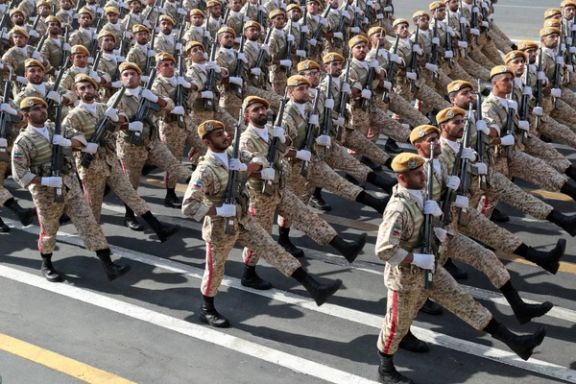
An Iranian army commander has said the country’s military remains fully prepared for any scenario as diplomatic uncertainty deepens between Iran and the US.
Brigadier General Nozar Nemati, deputy commander of Iran’s Army Ground Forces, said that Iran’s military remains on high alert. “The armed forces, especially the Army, are always ready to defend the ideals of the Islamic Republic and protect the country’s borders,” he told IRNA on Saturday.
His comments came just hours after US President Donald Trump revealed that he had sent a letter to Iran’s Supreme Leader Ali Khamenei, offering negotiations but warning of military consequences if talks fail over Iran's nuclear program.
"I hope you're going to negotiate because if we have to go in militarily, it's going to be a terrible thing for them," Trump told Fox Business Network in a segment of the interview broadcast on Friday. "There are two ways Iran can be handled: militarily or through a deal. I would prefer to make a deal".
Later on Friday, Trump told reporters at the Oval Office, “We are at the final moments with Iran,” adding that “something’s going to happen very soon.”
The letter was swiftly rejected by an official outlet of Iran’s Islamic Revolutionary Guard Corps (IRGC), dismissing it as a psychological operation. Iran’s UN mission in New York also stated it had received no such letter.
Iran’s Foreign Minister Abbas Araghchi, speaking on Friday, had accused Israel of trying to pull the US into a regional war. “It is Israel’s desire to involve other countries in war. It is Israel’s desire to draw America into war,” Araghchi told AFP, warning that US intervention would leave Washington “extremely vulnerable.”
Amid the growing tensions, Nemati reaffirmed Iran’s border security efforts, noting that the country has reinforced its defenses and remains in coordination with IRGC forces. “Our forces are stationed across all critical border areas, working in complete harmony to ensure security,” he said.
Iran has also continued large-scale military drills, including Zolfaghar 1403, which last month showcased its naval, air, and ground combat capabilities.
Trump’s remarks come as his administration escalates its economic pressure campaign on Iran. On Thursday, US Treasury Secretary Scott Bessent outlined a renewed “maximum pressure” strategy aimed at cutting Iran’s oil revenues and further devaluing its currency.
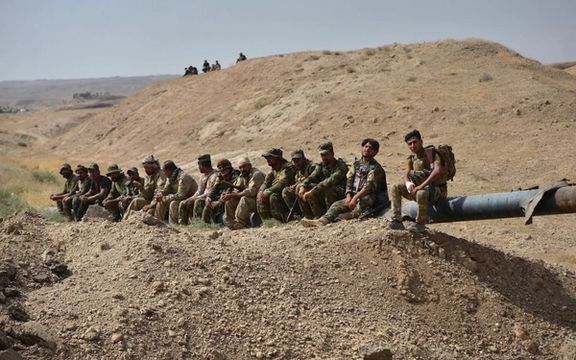
Leaders of Iraq’s Iran-backed Popular Mobilization Forces (PMF) fear the US may designate their group as a terrorist organization, following Washington’s reclassification of Yemen’s Houthi militia, a Kuwaiti daily reported Wednesday.
Fear over a potential designation prompted emergency meetings among Iraqi officials, including Prime Minister Mohammed Shia' Al-Sudani and PMF leaders, Al Seyassah reported.
A senior Iraqi official was quoted as saying that Washington’s decision is driven by Iraq’s refusal to dissolve the PMF and the group's close ties to Iran's Islamic Revolutionary Guard Corps (IRGC).
The State Department announced Tuesday that it is officially implementing its decision to designate the Iran-backed Houthi movement as a terrorist organization, setting in motion President Donald Trump's push earlier this year, to do so.
State Secretary Marco Rubio cited the Houthis' attacks on Red Sea shipping and threats to US and allied security as justification for the designation.
Since October 7, the Houthis have launched near-daily drone and missile attacks on Israel and targeted shipping, claiming it as an act of solidarity with Palestinians in Gaza.
The Popular Mobilization Forces (PMF), encompassing factions such as Kata'ib Hezbollah and Harakat al-Nujaba, have actively engaged in operations against US forces in Iraq and Syria, aligning with Iran's regional strategy.
Following a drone attack in January last year at a US outpost in Jordan—known as Tower 22—that resulted in the deaths of three US soldiers and injuries to 47 others, the US conducted retaliatory airstrikes targeting Iran-backed militia sites in Iraq and Syria.
Subsequently, Kata'ib Hezbollah announced a suspension of its military operations against US forces to prevent embarrassment to the Iraqi government, which had called for de-escalation.